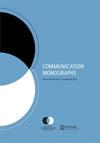老年人对成年子女照顾信息的心理抗拒的混合方法研究
IF 3.1
2区 文学
Q1 COMMUNICATION
引用次数: 0
摘要
摘要本研究将心理抗拒理论(PRT)扩展到家庭护理,通过探索成年儿童护理者用来获得年长父母顺从的自主性威胁信息。焦点小组和对老年护理接受者(研究一)和护理人员(研究二)的访谈结果证实了三种类型的自主威胁信息,这些信息用于测试PRT(研究三)。老年人(N = 281)被随机分配了一条护理信息,并回答了与电抗相关的调查问题。结果支持串行中介:相对于支持自主的消息,两种类型的威胁自主的消息(即提供指令、表达怀疑)引发了更大的自由威胁,这放大了反应。反过来,更大的抵触情绪会引发更多的消极态度,这与更低的行为意图有关。研究结果为老年人的抗拒体验和家庭护理沟通提供了启示。本文章由计算机程序翻译,如有差异,请以英文原文为准。
A mixed methodological examination of older adults’ psychological reactance toward caregiving messages from their adult children
ABSTRACT This study extends psychological reactance theory (PRT) to family caregiving by exploring autonomy-threatening messages adult child caregivers use to gain compliance from older adult parents. Results of focus groups and interviews with older adult care recipients (Study One) and caregivers (Study Two) corroborated three types of autonomy-threatening messages, which were used to test PRT (Study Three). Older adults (N = 281) were randomly assigned a caregiving message and answered reactance-related survey questions. Results supported serial mediation: relative to an autonomy-supporting message, two types of autonomy-threatening messages (i.e., offering directives, expressing doubt) triggered greater freedom threat, which amplified reactance. In turn, greater reactance elicited more negative attitudes, which was linked to lower behavioral intention. Results offer implications for older adults’ experience of reactance and family caregiving communication.
求助全文
通过发布文献求助,成功后即可免费获取论文全文。
去求助
来源期刊

Communication Monographs
COMMUNICATION-
CiteScore
5.40
自引率
0.00%
发文量
12
期刊介绍:
Communication Monographs, published in March, June, September & December, reports original, theoretically grounded research dealing with human symbolic exchange across the broad spectrum of interpersonal, group, organizational, cultural and mediated contexts in which such activities occur. The scholarship reflects diverse modes of inquiry and methodologies that bear on the ways in which communication is shaped and functions in human interaction. The journal endeavours to publish the highest quality communication social science manuscripts that are grounded theoretically. The manuscripts aim to expand, qualify or integrate existing theory or additionally advance new theory. The journal is not restricted to particular theoretical or methodological perspectives.
 求助内容:
求助内容: 应助结果提醒方式:
应助结果提醒方式:


